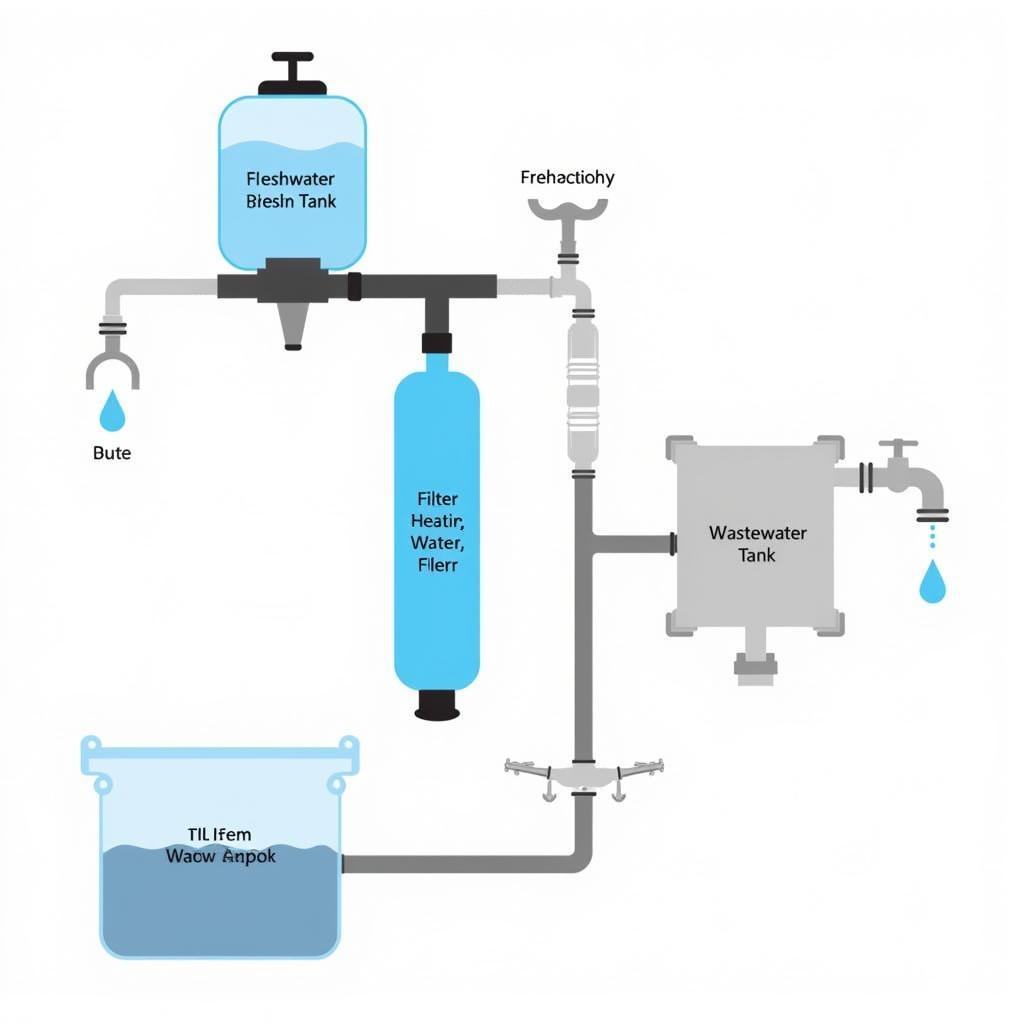Running water in a food truck is crucial, not just for convenience, but for complying with health and safety regulations. So, Do Food Trucks Have Running Water? The short answer is: they need to. Let’s explore the complexities of water systems in these mobile culinary powerhouses.
Many aspiring food truck owners initially underestimate the importance of a proper water system. After all, aren’t food trucks all about mobility and compact efficiency? While true, these mobile kitchens must adhere to the same stringent food safety standards as brick-and-mortar restaurants. This means having access to hot and cold running water for handwashing, food prep, and cleaning. Failing to meet these standards can lead to hefty fines, temporary closures, and even the revocation of operating licenses. You can find some great resources regarding food truck regulations on our Florida food truck inspection checklist page.
Understanding the Water Needs of a Food Truck
Why is Running Water Essential?
Running water is paramount for several key reasons:
- Sanitation: Handwashing is the first line of defense against foodborne illnesses. Adequate handwashing sinks with hot and cold running water are mandatory.
- Food Preparation: Many recipes require water, from rinsing vegetables to boiling pasta. Consistent access to clean water ensures the quality and safety of the food served.
- Cleaning and Dishwashing: Maintaining a clean environment is critical in a food truck. Running water is necessary for washing dishes, utensils, and surfaces, preventing bacterial growth and cross-contamination.
Different Water System Options for Food Trucks
Food trucks typically utilize one of three water systems:
- Freshwater Tank and Wastewater Tank System: This is the most common setup. A freshwater tank stores potable water, while a separate wastewater tank collects grey water and black water.
- Direct Water Hookup: Some food trucks opt for a direct water hookup when stationed at a commissary kitchen or a permitted event location.
- Portable Water System: Smaller food trucks or those operating at short-term events may use a portable water system with hand pumps or foot pedals.
Navigating Regulations and Requirements
Regulations Vary by Location
Regulations regarding food truck water systems vary by state, county, and even municipality. It’s vital to research the specific requirements in your area before setting up your food truck. Check with your local health department for detailed guidelines.
Water Tank Capacity and Maintenance
The capacity of your freshwater and wastewater tanks will depend on your menu and daily operations. Regular cleaning and sanitization of both tanks are crucial to prevent bacterial growth and ensure water quality. For keeping your food at optimal temperatures, check out our selection of hot water food warmers.
Tips for Efficient Water Management in Your Food Truck
Water Conservation Techniques
Implementing water conservation practices is not only environmentally responsible but also cost-effective. Simple steps like using low-flow faucets and pre-portioning ingredients can significantly reduce water usage.
Waste Management Best Practices
Proper wastewater disposal is essential for environmental protection and public health. Never dump wastewater illegally. Always dispose of it at designated disposal stations or your commissary kitchen. Considering starting a food truck business? Check out our food trucks el paso for sale.
Frequently Asked Questions (FAQs)
- Do all food trucks have onboard water tanks? Most do, but smaller operations might use portable systems.
- How often should I clean my water tanks? Regular cleaning, at least every few weeks, is essential.
- Where can I find information on local food truck regulations? Contact your local health department.
- What happens if my food truck doesn’t have running water? You risk fines, closure, and license revocation.
- Are there different types of water filters for food trucks? Yes, several types are available, each designed for specific needs.
- How much does a food truck water system cost? Costs vary depending on the complexity of the system.
- Can I install the water system myself? While possible, professional installation is recommended.
Having effective food shields can also improve the overall hygiene and professionalism of your food truck.
Conclusion
So, do food trucks have running water? Absolutely, it’s a necessity. A well-designed and maintained water system is paramount to the success and legality of any food truck operation. By understanding the regulations and implementing best practices, food truck owners can ensure they provide safe and delicious food while maintaining a compliant and efficient mobile kitchen.
Looking to incorporate alcoholic beverages into your menu? Our alcohol food truck guide provides valuable information on navigating the legal complexities of serving alcohol in a mobile setting.
 Food Truck Water System Diagram
Food Truck Water System Diagram
Need more information or assistance with your food truck venture? Contact us at Phone Number: 02437655121, Email: [email protected] or visit us at 3PGH+8R9, ĐT70A, thôn Trung, Bắc Từ Liêm, Hà Nội, Việt Nam. Our customer service team is available 24/7.